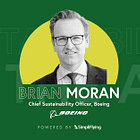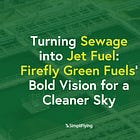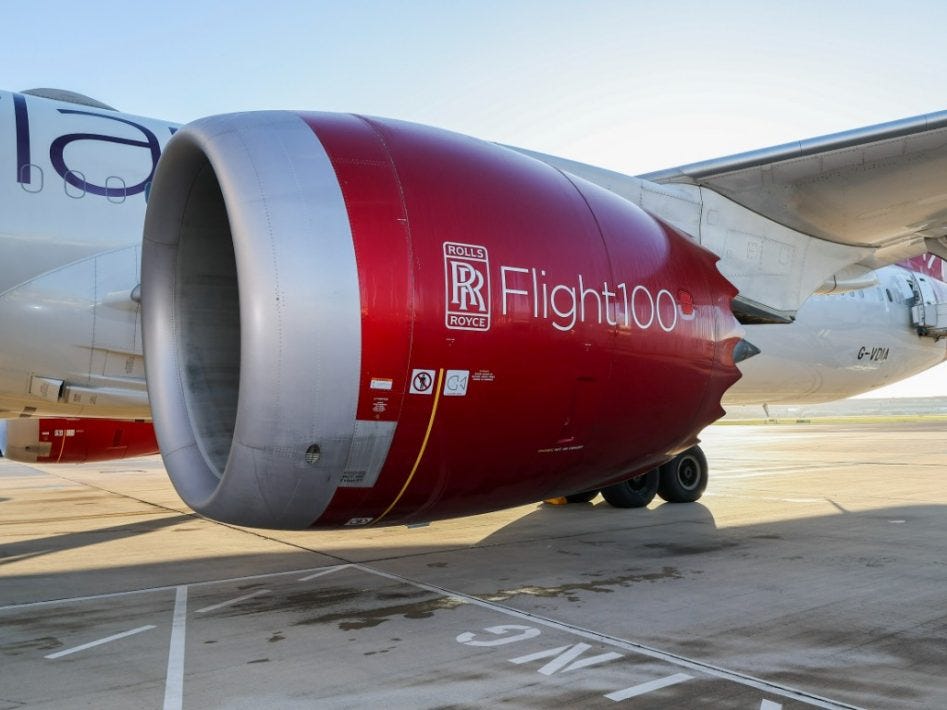How Boeing is catalysing UK's SAF market
Partnership with Clear Sky will support Firefly Green Fuels' technology which can transform sewage waste into SAF with a 90% reduction in lifecycle emissions.
Boeing organised a series of events at the Farnborough Airshow last week, showcasing the UK's approach to scaling sustainable aviation fuel (SAF) production and deployment. As part of this, the aerospace giant announced a new partnership with Clear Sky, an investment firm focused on aviation sustainability.
Boeing and Clear Sky launch partnership to decarbonise aviation
The partnership's first project involves supporting Firefly Green Fuels, a UK-based startup that has developed new technology to transform sewage waste into SAF through a process called hydrothermal liquefaction.

This process uses heat and high pressure to convert waste into bio-crude oil and biochar, a powdery substance used as fertiliser. Compared to traditional petroleum jet fuel, Firefly says that the resulting SAF reduces lifecycle CO₂ emissions by over 90%.
Brian Moran, Boeing's Chief Sustainability Officer, emphasised the significance of this collaboration:
"SAF offers the greatest opportunity to decarbonise aviation, and the industry's collective challenge of bringing it to scale globally requires new sustainable pathways. Clear Sky combines many years of investment expertise with knowledge on aviation’s decarbonisation challenges. Firefly’s technology holds transformative potential as the SAF feedstock, sewage waste, is accessible in all regions of the globe.”
A Clear Sky-led consortium, including Boeing, will invest in Firefly's new technology, subject to final diligence. Boeing will also provide training, guidance, and testing facilitation to accelerate the qualification of this new SAF pathway.
SAF roadmaps: A panel discussion with industry leaders
The urgency to scale SAF production is underscored by the fact that SAF currently represents at most 0.5% of global jet fuel use. In the UK, the government has set targets for SAF adoption: 2% by 2025, 10% by 2030, and 22% by 2040. Achieving these targets will require a significant increase in production, with a particular focus on increasing domestic production capacity.
Consequently, Boeing also hosted a panel discussion at Farnborough featuring key figures from the aviation sector. The discussion emphasised the importance of SAF roadmaps and highlighted the UK's leadership in this area.
The panel, moderated by veteran industry journalist Mark Pilling, featured Boeing's Steven Gillard, Virgin Atlantic's Holly Boyd-Boland, the Department for Transport's Debbie Stockwell, and other industry leaders. They discussed SAF's global potential, the specifics of the UK's approach, and the challenges and opportunities ahead.
Steven Gillard highlighted the potential of agricultural and woody biomass to meet over 100% of jet fuel needs by 2050, stating, "It's out there, but we need to unlock it."
Holly Boyd-Boland, VP of Corporate Development and Chief of Staff at Virgin Atlantic reaffirmed the airline industry’s commitment to SAF, stating, "Airlines have been clear: if we can access SAF at a reasonable, affordable price, then we will use as much as we can.”
She also stressed the need for swift action, highlighting the successful demonstration of 100% SAF use in existing engines and infrastructure during Virgin Atlantic's "Flight 100” last year, which achieved a 64% reduction in lifecycle emissions.
Debbie Stockwell, Deputy Director of Low Carbon Fuels at the UK's Department for Transport, outlined the government’s multi-faceted strategy to support SAF production and adoption.
"We've been working on SAF for about four or five years now, with a significant ramp-up in the last couple of years", she stated. "The SAF mandate is what creates the market and drives the fuel, and we've seen this with the renewable transport fuel obligation for the road sector as well."
The UK's SAF mandate, a key component of the government's strategy, requires fuel suppliers to blend a certain percentage of SAF into their jet fuel. This mandate is designed to create a stable demand for SAF, incentivise investment in production, and drive down costs over time.
In addition to the mandate, the government will introduce a revenue certainty mechanism to address price fluctuations in the SAF market, which will provide investors with greater confidence and further stimulate investment.







